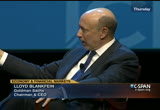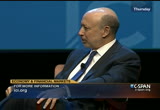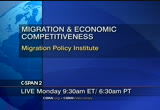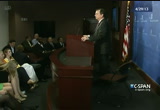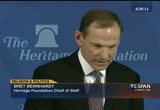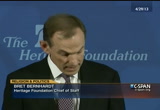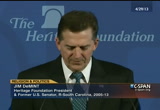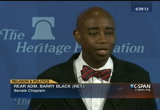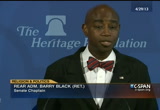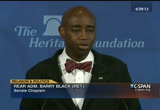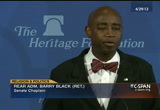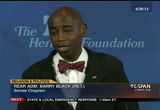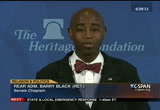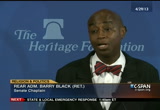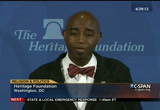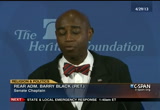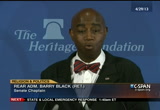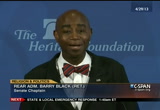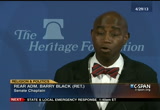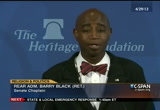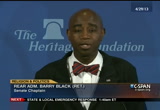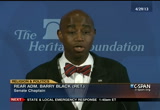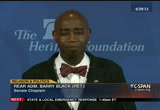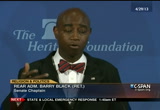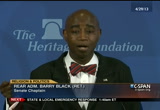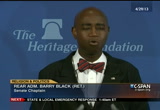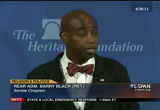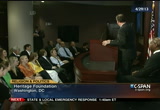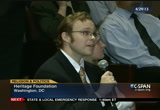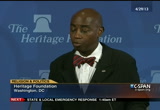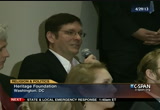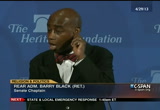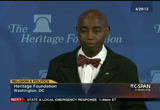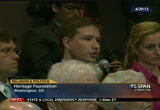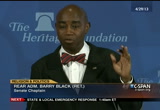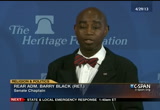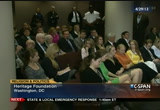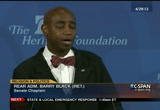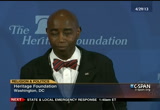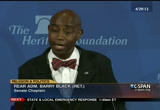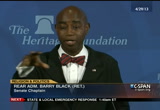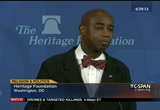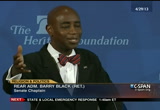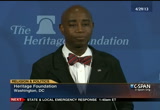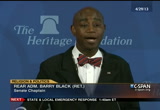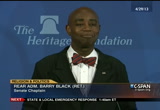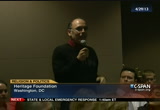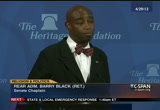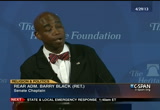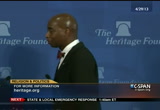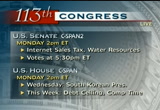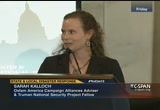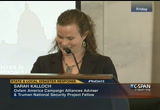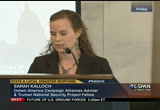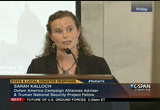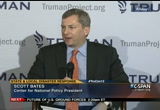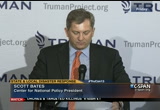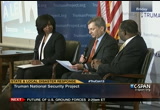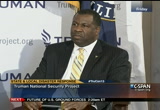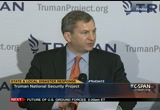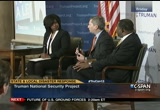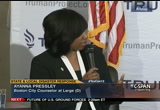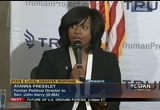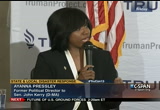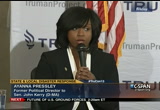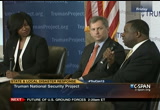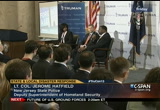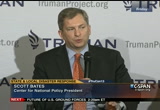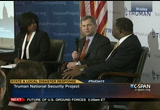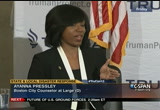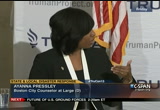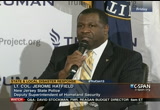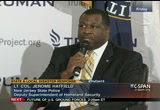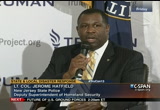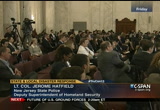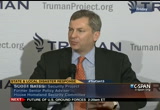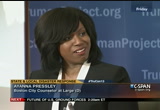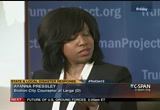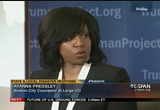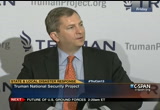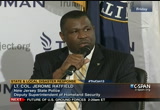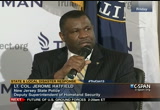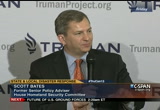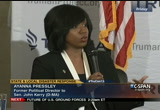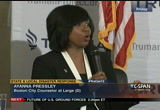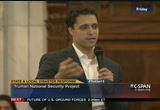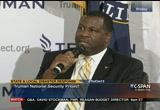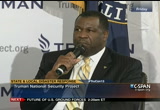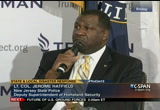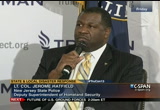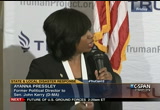tv News Politics and Public Affairs CSPAN May 6, 2013 12:50am-2:21am EDT
12:50 am
will take you in the longer run. not only don't you know the context he will face, you do not even know yourself. so the idea of planning these things, will this be good for me in the long run, people should take advantage of the fact that in this generation nobody is getting drafted into the army, you can have a few years of experimentation that you can be liberated from the need to make sure everything is taking you on some straight line to someplace. it does not have to be a straight line anyway. >> enjoy the ride because you never know where it might take you, even to the chairmanship of goldman sachs. >> and do not worry about knowing the contents of your business -- you have to know content but you also have to be a complete person. in your early part of your life you should focus on being a complete person. >> agreed. ladies and gentlemen, join me in thanking lloyd blankfein. [applause]
12:51 am
[captioning performed by national captioning institute] [captions copyright national cable satellite corp. 2013] >> the british house of commons is in recess this week. prime ministers questions will return may 15. c-span will bring you live coverage of the official state opening of parliament and the queen's speech which officially begins the new session. >> more of to live events on monday, on our companion network, c-span 2. hirst, a report on immigration and economic competitiveness in mexico and south america with former commerce secretary carlos gutierrez and former mexico resident ernesto zedillo. that is live at nine 11:30 a.m. eastern. a look at -- 9:30 a.m. eastern. a look at the political situation in egypt. the new america foundation will
12:52 am
host a discussion about egypt's new generation of leaders in the countries current political structure. our coverage begins at 12:15 p.m. eastern. >> senate chaplain barry black talked about the conflict between religious and secular views. he focused on the role of religious liberty and political freedom in the the founding of the united states and the influence of religion on democracy. from the heritage foundation, this is about 45 minutes. >> we, of course, welcome all of us who join us on these occasions and on our heritage.org website and those joining on c-span. we would ask everyone here in- house if you would be so kind to see that cell phones are being turned off as we prepare to begin.
12:53 am
all of us would appreciate that, especially those recording the event. we will post the program on the heritage homepage within 24 hours for your future reference as well. now, if you would please join me in welcoming our presenters. they will take their place on the stage. gentlemen? [applause] >> thank you, john. my name is bret bernhardt, chief of staff at the heritage foundation, and it is a joy and honor to be here today along with senator demint to present chaplain barry black to the heritage program. having served in the senate as a chief of staff, i can tell you his unique position in the senate, a secular institution.
12:54 am
as we look at the topic, bridging the religious and secular divide, it might be thought the intention is to meld the two sides into one. what a perfect analogy but it is helpful to consider what the purpose of the bridges. it does not exist to close the divide, fill the divide or eliminate the divide. the bridge acknowledges the divide. it exists because of the divide. it simply traverses it. the invitation put it well when it said -- it is possible, however, to bridge the divide between the secular and religious world, and quite arguably, for the betterment of both. i can think of no better description of what chaplain barry black does then this invitation description. he is, as the scripture says, the man standing in the gap. as the pastor of the senate he serves as counselor, comfort and friend to many, including myself. rarely a day goes by i do not consider something he has taught in one of the staff bible
12:55 am
studies which helped me through a challenging situation. after all, someone who has spent most of his career deployed months at a time as a navy chaplain has plenty of practical advice, let me tell you. it is my pleasure to introduce senator jim demint, president of the heritage foundation, who will introduce chaplain black. [applause] >> thank you, folks. barry, it is wonderful to have you here. out of the darkness and into the light here at the heritage foundation. i know, i just came from there myself. chaplain black was commissioned in 1976 as a chaplain in the u.s. navy, and he retired as a rear admiral after a nearly 30- year career serving as navy chief of chaplains in his last position. he has earned doctorates in both philosophy and ministry. his biography "from the hood to in
12:56 am
the hill" recounts the story of overcoming unpromising beginnings in the inner city of baltimore. his more recent book "the blessing of adversity -- finding your god-given purpose in life's troubles" distills the wisdom he has gained from 30 years as a counselor, theologian, and psychologist, for addressing the many trials in life. barry, we have plenty of those, so i appreciate you coming and sharing with us today. [applause] >> thank you so much.and i i am extremely nervous today because members of my staff are here. [laughter] and they are critiquing me.you and they are critiquing me. a lady approached me some time ago and said, dr. black, if they permit prayer in the legislative branch of government, why have they removed prayer from our schools?
12:57 am
and i must confess that i was rather flippant in my response. it was a reflex, and i should have thought through my response a little more carefully. i sit, madam, -- i said, madam, as long as there are final exams there will always be prayer in schools. it demonstrates the fact that even in a secular environment, the spiritual is often present. in 1787 at the continental could congress -- at the continental congress, the group reached an impasse when benjamin franklin spoke. and he said "gentlemen, i am an old man. but i have lived long enough to know that if a sparrow cannot
12:58 am
fall without god knowing it, that an empire or a republican-- a republic cannot rise without his help." and franklin suggested that the group should pray. i think it is an example of bringing the spiritual into a secular environment. many of us feel that the work of the spiritual is that of the minister. and if i were only an ordained clergy person, i could certainly inject some spirituality into my workplace, my work environment. but it's more of a secular environment. i would challenge that presupposition. i think it is critically important to remember that 90% of the life of jesus was spent in a secular occupation.
12:59 am
he was a carpenter. only three years in what we would consider the priest, prophet ministry and outreach. 75% of our biblical heroes and heroines were involved in secular occupations. and yet they were able to bring the spiritual into those occupations. daniel, shadrach, meshach and abednego -- or as we would say, a bad negro. nehemiah was a cupbearer. so many brought the dimension of the spiritual into a secular environment. joseph was prime minister of egypt.
1:00 am
and what an amazing contribution he made, bridging the divide between the sacred and secular. as a senator demint mentioned, i was in the navy for 27 years. and i was delighted to be and that military organization, because as most of you know, jesus was a navy man. [laughter] ships, walking on water, although some say he was a marine, but i believe he was in he navy. to do the exegesis correctly, e was in the navy. i remember having a supervisor, second in command, who was an individual that i did not enjoy being with. must confess. confession is good for the soul. he rarely spoke a paragraph without plenty of profanity. and that is rather aggravating
1:01 am
for a person of the cloth. well, he was writing my e-mail you a. so what do you do? i would take him on in the evening prayer. on the ship there was a public address system and in the evening the chaplain offers a prayer and a very inclusive prayer for all of the sailors. the executive officer and i were going back and forth, as i would be debating him in the rayer and he would, of course, after the prayer, as i was leaving the bridge -- with the chaplain please report to the executive office. i would come in. what is wrong, sir? "how dare you talk about me in the prayer." i said, i did not mention names, but i just said god would be offended by the amount of her vanity happening on the, even at the highest level.
1:02 am
a clever way of bridging the divide between the sacred and the secular. but then a new commanding officer came aboard. he did not wear his religion on his sleeve. he did not even attend the worship services or the bible studies that i conducted on the ship third -- ship. after two days of wandering around the ship, he had a captain's call -- this is when the new commanding officer he finds a reality for the ship. one of the things he said, quoting, was that there would be no profanity aboard his ship. was startled. no profanity. he quoted george washington who said something about needing to se profanity was an indication f a limited intellect. so, buried was.
1:03 am
and i honestly believed that there was no way -- so, there it was. and i honestly believe there was no way the executive officer would be able to speak standard english. the end of his career. no way he would be able to obey this order. this was an order that was too much for him. i have never heard him speak more than a sentence or two without using profanity. but miracle of miracles, all of sudden the language on that ship was clean. and it was absolutely amazing the difference that it made, because an individual -- and i don't know how religious he was -- was able to inject the ethical and the moral into a secular environment. my challenge to you, if you are a person of faith, is to find a way to bridge that divide and o recognize that many times to make a dichotomy between the
1:04 am
sacred and the secular is incorrect. the lebanese-american -- in his wonderful book "the prophet" -- if you have never read it, you should. it is lyrical. prophet was leaving a town, nd they ask him to speak about various things, and speak of love. he said, i am really not a speaker. but whenever they would ask him to speak, these lyrical soliloquies would follow. one love beckons to you, following, his ways are hard and steep and when the wings of love unfold you, yield to him. the sword hidden him his pinions would wound you. he says your children are not your children, they are the sons of daughters of life longing for itself who come through you but not from you, and though they are with you, they do not belong to you. then finally someone said, speak to us of religion.
1:05 am
and he said "have i spoken this day of ouht else?" s not religion albeit an reflection and not -- everything not been an reflection a wonder and a surprise ever springing in the oul? think first corinthians 10:31 captures what we should be doing if we are wanting to make sure who we are as spiritual beings follow us into the workplace. it says -- "whether you eat or drink, or whatever you do, the do it all for the glory of god." it is basically challenging us
1:06 am
to glorify god in our behavior. whether we are at work, whether we are at home, wherever we are and whatever we do, we should strive to glorify god. want to make just a few suggestions on how to do that. the first suggestion is to be salt and light. now, some of you have heard the great communicator ronald reagan talk about america as a shining city upon a hill. he was actually paraphrasing matthew 5:16 when jesus said you are the light of the world, a city set upon a hill cannot be hidden. e ought to be salt and light f we are to glorify god in the workplace. salt makes food palatable. i spent a lot of time in south
1:07 am
carolina pastoring the alumnus of the university of south carolina -- at sumter. and anyhow, i cannot imagine grits without salt. i shudder at the thought of grits without salt. your presence in the workplace, bringing who you are as a spiritual building and glorifying god and all you do should make the work lace more palatable. -- workplace more palatable. people should not be high-fiving one another when you have a six day. you should, instead, make the workplace a more peasant environment. be salt. salt, in the days before refrigeration, also preserved food. and your presence in the orkplace, bringing who you are is a spiritual being, should make the workplace a more secure environment. you will recall in genesis 18, abraham interceding for sodom and gomorrah. "god, if there are at least 10
1:08 am
people there, will you spare the city?" james chapter five:16, says the effectual and fervent prayers of the righteous and feel much. when you can't do anything else you can always pray. and there is power in your prayer. so, be salt by making the workplace more secure with your intercession. e salt by making the workplace and more palatable place. and be light, illuminate. illuminate. make a difference by the insight you bring based upon he knowledge you have of sacred scripture. many times, you don't give chapter and verse, of coarse, but simply paraphrasing a
1:09 am
biblical insight will help you o be a force for good, particularly when in the work place people are facing right vs. right conundrums. it is easy to facing right versus wrong conundrums, but right versus right of the most of cocoa salt. that is one of the reasons why we are challenged in the legislative branch, because many of the issues -- not all of them -- but many of the ssues debated in the chamber involve right versus right conundrum. truth versus loyalty, long-term versus short-term, justice versus mercy. right versus right. the individual versus the community. and you, a person of faith with revelatory knowledge can illuminate that environment. n the same way that joseph was
1:10 am
able to give illumination to the pharaoh. and daniel -- he was able to give illumination to ebuchadnezzar and later darius and cyrus of the persian mpire. second, witness without words. that is tough to pull off because a lot of us are good talkers, but we don't back up our talk with our actions. and if you are ethically congruent, your action should be the key thing you focus on. francis of assisi said preach the gospel everywhere you go. when necessary, use words. so you, a force for good in the workplace, can make a
1:11 am
ifference without saying anything. paul put it this way in second corinthians -- you are a living letter to be read by all who see you. a living letter. edgar guest put it another way -- saying i would rather see your sermon than hear it any day. i would rather you walk with me then to really -- merely tell the way. the eyes are better pupils and more willing than the years. find counsel is confusing, but example always clear. and best of all, the teachers are the ones who lived their creed. to see good put in action is what everybody needs. i soon can learn to do it. if you let me see it done, i
1:12 am
can watch your hands in action but your tongue too fast may run. and the lectures you deliver may be ever wise and true, but i would rather get my message i observing what you do. witness without words. finally, if you are going to bridge that divide between the acred and the secular, live to serve. your focus should be about servant labor or servant leadership. max dupree wrote a wonderful book, and in the book he said there are three responsibilities of eadership.
1:13 am
the first is to define reality. the leader projects division for those who are working in a particular organization. the last responsibility of a leader is for making sure there is an orderly transition from the organization to retirement or wherever the person is going after he or she leaves. to say goodbye in a dignified way. hat is why in the navy we have what we call hail and farewell and you have to be at the hail and farewell to say goodbye to folks, even though you did not particularly care for them. but in between, says dupree, the leader is a servant. how can i serve question mark and it is this proclivity for service -- how can i serve? and it is this proclivity for service that should make all the difference in the world. are you a servant? paul put it this way in first corinthians chapter 4 -- eight of yourself as a servant and steward of the mysteries of god. am i serving? one of the last two speeches ade -- actually it was a
1:14 am
sermon, but it was made by martin king, the last servant -- sermon he preached, he talked about what he wanted said at his funeral. he said if any of you were around, when it comes my time to meet my day, i want a long funeral. get somebody to deliver the eulogy and tell them not to talk too long, not to mention i won a new bell -- nobel peace prize, not to mention the 300 or 400 other awards. tell them not to mention where i went to school. because i want somebody to be able to say in that day that artin luther king, junior, tried to give his life serving others. i want them to be able to say that martin luther king, junior, tried to love somebody. i want them to be able to say that i did try to feed the hungry, to clothe the naked, to visit those who were in prison.
1:15 am
i want to -- then tuesday i tried to be right on the war uestion -- i want them to be able to say i tried to be right on the war question. want them to be able to say i tried to love and serve humanity. he ended, as every baptist preacher has to do, with a little bit of lyrical intimation -- we call it whooping in my tradition. i don't want to frighten anybody. yes, if you must say i was a drum major, say that i was a drum major for justice. to say that i was a drum major for truth. say that i was a drum major for righteousness. and all of the other shallow things of life would not matter. i won't have any money to leave behind, he said. i won't have any of the fine luxurious things of life to leave behind. but i just want to leave a committed life behind. nd that is what each of us can
1:16 am
do if we will bridge the divide between the sacred and the secular. if we are salt and light wherever we are, if we witness with our words, and if we live to serve, then the words of the hymn writer will become true. if i can help just one somebody as i pass along, then my living shall not be in vain. od love you. >> do you think we can arrange for this every monday at noon? we will be glad to take questions. we have a microphone. and if you would be so kind to introduce yourself and make your question in the form of a question, we would be happy to recognize you.
1:17 am
own here in the front. >> thank you so much, chaplain lack eared your words inspired us. i would like to ask, in light of recent events, breitbart spoke about tapping a christian really just extremist -- and on top of that, the push to make military chaplains accept the gay marriage and push that in the military environment. how do you see a committed christian being able to stand up against things that might be considered religious persecution in the united states and in politics today? >> the military has a religious ccommodation policy that you
1:18 am
would have to eliminate to pull it off. the religious accommodation irectives make it clear that a clergy person cannot be forced to do anything that he or she is not comfortable with doctrinally. ilitary chaplains serve in a context called institutional duality. they are endorsed by a church, so they receive an ecclesiastical endorsement as well as being commissioned by the military. and a withdrawal of an ecclesiastical endorsement would remove the chaplain from his position as a chaplain.
1:19 am
so, there are safeguards right now that would have to be removed. i can see many military chaplains having some problems because to preach the passages of paul with exegetical integrity would mean being ccused of engaging in hate speech. so, this is a challenge that i hink we are going to have to deal with going forward. >> yes. right here. >> when you talk about being salt and light and witnessing without words, you talk about christians eating more of a quiet witness. but i wonder, when is it appropriate for crittenden -- christians to be more of a loud witnessed? things like protests, oycotts. the civil rights movement or today, abortion protests or boycotting certain companies and things like that. how should christians decide when to be a quiet witness versus when it is appropriate to be loud? >> well, aristotle wrote a
1:20 am
marvelous book called "the rhetoric was quote and he said to persuade you need a tripod of threes things. he used greek word. ethos, pathos and -- thos is being perceived as ethically congruent. that is what witnessing without words is all about. the problem is, we are often loud before we have the prelude of the silent witness of our integrity and of our sensitivity, particularly to the marginalized. so, i think, yes, there is a time for a louder witness. but that should be preceded by a lot of loving, a lot of serving. the civil rights movement was actually a great example of itnessing without words. because -- i participated.
1:21 am
i was in alabama in the 1960s at the segregated lunch counters and i sat in the audience listening to martin luther king speak. we put our bodies on the line without making speeches. martin was our spokesperson. but when we faced the billy club of the police officers and the police dogs, we did not say a word, and yet aroused the conscience of a nation without words. o, i think there is a time for louder witness. ut someone said, what you do speaks so loudly i can't hear what you say. >> we will come right there first. sorry. working my way around. > thank you so much. am an intern at heritage.
1:22 am
i am curious what you think -- here seems to be -- to go back to aristotle, for a second. politics is supposed to be about justice. and society's understanding of justice seems to have been shifting over the last couple of years, maybe longer i'm away from the idea of justice that is understood by people of faith come up particularly the christian faith. now we see conflicts arising come up people say my conscience be clued from paying for this kind of procedure and nsurance and the hhs mandate says justice as defined by the politics of the country requires you to pay for this. at what point does there be, a separation between that secular definition of justice and the religious definition of justice such that the people on that religious side start to become excluded from political participation? and how do you prevent that sort of thing from happening?
1:23 am
>> well, i think jesus' statement rendered to season things that are caesar's and to god things that are gods, that is a critical part when you when you are wrestling with issues like that. but i think also that a person has to have sufficient integrity where there are lines you will not cross. and you have to have the courage -- like shadrach, nice atch, and a bendigo -- and abendego. do this or burn. my god will be able to deliver us. he will deliver us. even if he does not -- and they are talking to the king -- we would rather bow than burn. we do not know where daniel was at that time. we hope he was out of the country. in daniel chapter six, we see daniel go into the lions den rather than obeying an unjust law. the whole civil rights movement was based upon this notion of
1:24 am
isobeying unjust laws. that is what gandhi did. so, we have a history of nonviolent direct action, and we certainly have enough evil -- enough people of faith that there are creative ways we can tackle any challenge we ace. but we have to be a lot more creative in that approach. having 18 -- a team effort. the harvest is white and the laborers are few. what do you do? pray that the lord of the harvest will send forth laborers. we need more neighbors -- laborers to help them in the challenging situation. have the line that you will not cross. it does not take a lot of folks to make a difference. it really does not. i chronicles 7:14 -- if my people who call my name humble hemselves and pray, then i
1:25 am
will eared them -- heal them, forgive their sins and heal their land. a powerful force that knows how to speed dial heaven. > i was interested in your understanding -- i was also curious if you got any instruction about this when you started your position for the u.s. government. the origins of prayer and the congress. y understanding was that really was started by benjamin franklin who, i believe he did have various religious beliefs throughout his life. at the time he proposed that, it seems to me he was probably a deist. was not someone who believed in the same god that i believe in as a christian. i am wondering, how do you see prayer and how was it proposed to you to be used in congress?
1:26 am
it is one thing i'm a bit -- it is one thing, a prayer for a christian or a believer in nother religion or someone who may be nominal in the faith or someone agnostic, atheist, or deist. >> franklin was, in 1787, at the continental congress but prayer came to the congress in 1789. interesting enough, it came three days before the stabbing smith clause of the first amendment. congress shall make no law respecting the establishment of religion or prohibiting the free exercise thereof. on the day the establishment clause was proposed, there was a prayer. nd there has, for the most part, been uninterrupted prayer since 1789. i think franklin's notion of needing contact with the transcendent is at the foundation of this whole notion of prayer.
1:27 am
we are enjoying enjoined in first thessalonians to pray without ceasing. e should always be in an attitude of prayer. but if there is any place on the planet where prayer is eeded, it is capitol hill. ok? so, i think that the basic -- it happened in 1789. the basic thrust was we need to be connected with the transcendent. i think prayer makes a difference. it really does. the effectual fervent prayer of the righteous avails much. >> chaplain john hamill. since you are a daniel in the ongress -- >> in the lions den. >> we are praying for you.
1:28 am
would love to see a few examples where you have seen the hand of god move in congress related to your ntercession? > well, when i first arrived in the senate in 2003 i had a lady who came to me and asked me to pray for her because she had been diagnosed with inoperable cancer. we have a prayer team of several thousand people. and we just give the first name and what the problem is. i encountered this lady three or four months later and she was smiling. he had begun to feel so good that she had gone back to her physician and said "if this is dying, it's not too bad." he brought in all these experts and, bottom line, could find no evidence of cancer at all. i ended up eight years later -- she was 90 -- delivering the eulogy at her funeral. she died, but not of
1:29 am
cancer. she died of something else. so, an example, i believe of ames 5:17, if there be any sick among you, pray. i am convinced the debt celing prayers, sequester prayers -- we stay on our knees. time and time again, sometimes at the 11th hour we have seen god stepped in and make a difference. i have had senators say to me, chaplain, something you said in the prayer caused me to change my vote. i don't know what it was, but i am sure the holy spirit has a way of touching hearts. it probably was something i did not intend to be directed -- but god has a sense of humor. so, that is a good book to read
1:30 am
-- but time did not permit me to tell you the many, many times i have seen prayer answered in the u.s. enate. >> their parents are hindu and sikh. their parents wanted their own god on capitol hill. how would you react? but then a muslim might have their own demand. how would you reconcile so many religions and so many kinds of prayers and then having at some point -- some have more than one god and statues -- representing god on capitol hill.
1:31 am
hanks. >>well, ari -- a famous roman catholic writer tells the story of exodus and the children of israel going through the red sea. of course, they go across on ry land. and when the pharaoh tries to follow, the waters, and the army is drowned. the angels in heaven are looking at god -- in his writing -- and tears are coming down the faith of god. the angel said, god, why are you crying? your children, the israelites, had just been freed from egyptian slavery, for centuries of slavery. god responds -- yes, but my children the egyptians are dying. i think our efforts to put god in a box and to define the transcendent -- we are like
1:32 am
children building sand castles. and we've inc. -- i think we will discover there is a greater unity of divinity that surrounds the planet than we realize. so, you know -- call him by whatever name you want to call hem. i believe he has the whole world in his hands. >> in the back. >> congressman walter jones has been introducing a bill for years to let military chaplains and a prayer -- and prayers are broad with "in jesus' name." can you gauge the morale of broad and give your opinion?
1:33 am
>> i spent 27 years in the navy -- based rock -- retired two star admiral. i have prayed during that 27 year ministry thousands of times in the name of jesus. in a worship service am a file -- in the worship service, bible studies, when i am ministering to the sick. military chaplains on a daily basis pray in the name of jesus. but because we are in a pluralistic environment of ministry, there are times when a more inclusive prayer should be prayed. or instance, three marines have been killed, two of them are muslim. for me to pray a christ-centered prayer would probably be inappropriate, would probably not be best peered would not say inappropriate. or when i am praying over the one -- i have hindus and i am facilitating for them and i
1:34 am
pray a prayer -- you are on the ship, there is no way you can -- well, you can jump overboard, but you have to hear the prayer and there is nowhere for you to hide. for me to pray in the mighty name of jesus, that name that is above every name, would probably be a little over-the-top. so, the times when military chaplains cannot write in the name of jesus, in my opinion, from my experience, those were few and far between. i do it hundreds of times. i baptized folks, the whole nine yards. and then i talked about religious accommodation. if a chaplain comes from a religious tradition where he or she says, you know, if i don't say that name, it is not a prayer. you say, fine. ok. we will get someone else to say the prayer for this particular venue. no problem at all. even as there are some chaplains who sprinkle and
1:35 am
others, of course, correctly, immersed -- just joking. i knew senator demint was here, so i had to throw it in. some baptize babies. o problem. if you are not comfortable with that, we will get someone else to do that. what, you know, you can stay committed to your conscience and follow it. i don't see it as a serious problem. from my perspective of 27 years of labor in the military. >> my name is antonio chavez, a science teacher. i read in "the moxie of america -- "democracy in america" tocqueville said religion was essential to american democracy because he thought democracy would release selfish instincts and religion would keep those instincts in check.
1:36 am
when you look at what is happening in europe, what do you think about that? >> there is debate about whether or not alexis de tocqueville actually said that and also debate about the famous quote, america is strong because america is good, when america ceases to be good, america will cease to be strong. however, if he did not say it, he should have said it. it is basically a paraphrase of robert 14:34 -- righteousness exalts a nation but sin is a reproach to any people -- proverbs 14:34. sin is an equal opportunity destroyer. it does not care your name is america. and if you look at empires that have imploded -- babylon, alexander the great in greece, rome -- "decline and fall of the roman empire." you know, sin can destroy.
1:37 am
i think people of faith should recognize the contribution they make to the national security. i talked about genesis 18. abraham negotiating for the survival of sodom and gomorrah. he started up around 35 and winnowed down to 10 -- he figured there got to be at least 10 righteous folk in the whole town. after all, you've got lot, he's got daughters, a wife. if he is doing any kind of work -- could not even find 10. so, i believe alexis to tocqueville is on target that we do need to appreciate goodness, celebrate goodness, and be willing to die for goodness because it is a national security issue. >> one more. >> anyone from my staff? >> if not, thank you very
1:38 am
much. > thank you. >> we do, of course, have copies of both of his books available if you would like to have them signed by chaplain black. while i do have the podium, i want to thank you for your service to the nation during your career in the navy. thank you for your service to he senate where we know they need as much help as they can get. tank you for your wonderful example. you have an open invitation to come visit us anytime. thank you, and thank you all. >> wonderful. >> thank you, sir. national captioning institute] national able satellite corp. 2013]
1:39 am
>> next on c-span state and local response during the boston bombings. later a panel on treating mental illness. law makers return from a week long recess monday. the senate plans to complete work on the internet sales tax bill. they'll vote on a bill for the army corp of engineers for flood protection. monday in the house a handful of suspension bills. they'll host a joint meeting of congress to host the south orean president.
1:40 am
from an event hosted by the trueman national security roject this is 40 minutes. >> i'm here to introduce this afternoon's panel which for about a decade my brother and i have had a tradition that is boston y thousands of people heading to fenway park. screaming north car line and when we won everyone pours into the streets to watch the boston marathon and to marvel over mind over matter again and again to the elite run whores are running four minute miles to father a row,
1:41 am
pushing son in his wheelchair at age 72 and members of the national guard running the race with 40 pound rock sacks. i cry many times during the race because humans did k do amazing things. i cried this year for different reasons. i cried because my brother was safe and because others were not that lucky. boston is my home and there is no better day than boston marathon monday whand it means to be a patriot in our city. somebody tried to take that away from us and they won't ever. this is our fing city. i'm aloud to say that. we are boston strong and that
1:42 am
mmunity is true man strong because within minutes they were making sure we were okay. we were to tweet and text and facebook until everyone was accounted for. at a time when there were too many questions boston director had folks over to his house no agenda, just time to be together. and we came together about a week later on terrorism. emotional and strong and solution oriented which of course are all words that can describe everyone in this room. because every day members thoff community, all of us are working to make the world a better place, more peaceful, more prosperous and resilient. i was not in boston that day for the first time in many days. i was here in d.c. lobbying alongside farmers and business
1:43 am
leaders, state politicians and four trueman veterans of the war in afghanistan. that day we were on the hill trying to make sure people around the world have enough to eat, can send their children to schools and live in peace. the incredible power of this community from warriors to wonks and all of us who are many of those things. all of that power is pointed in the direction of right. that has been a huge comfort to me and the boston chapter. in boston we know that resilient communities aren't built over night. they require leadership. we have three leaders with us today. president's of trueman's partner think tank an important voice of homeland security. cott was an advisor to
1:44 am
homeland security after 9/11. they have worked on issues from bio terrorism to border security. they are creting actionable guidance so state and local officials can build more resilient communities. >> thank you very much. i don't know if this is on but we'll figure it out. before we go forward, i would like every member of the boston truman chapter and everyone with family and friends in boston to please stand up. [applause]
1:45 am
thank you. today we're going to be talking about how two different american communities responded to two different kinds of chris sises and how they are using the tools of social media to build more resilient communities. in each case first responders working in partnership with ordinary citizens rose up to respond to extraordinary challenges. in each case they have shown grace under pressure and shown that they are respectively jersey and boston strong. to share with us the stories of their communities we have with us two extraordinary leaders. to my right she's dedicated her life to public service.
1:46 am
prs presley was elected to the boston city council in 2009. she serves as the chair on women and healthy communities and is serving as vice chair on the committee of public safety which she worked as a senior aid for joe kennedy the second and john carrie n. addition to her work in government, she has been an active leader in the non-profit community on issues relating to women and girls, civic engagement and diversifying political leadership. she serves in leadership positions with the massachusetts political caucus, the action for boston community development and many others. she's a resident of the ash mont adams section of dor chester in the city of boston and did i mention she is the first woman of color elected in the hundred year history of the boston city council.
1:47 am
[applause] she is also a member of the truman community. [applause] to my sleft lieutenant colonel hat field. he's a 26 veteran of the state police and serves add deputy superintendent for the state of new jersey. he commands more than 800 staff representing areas which will you the new jersey office of emergency management and special operation sections. as deputy state director for the ngnnl office of emergency management he is responsible for the delivery of emergency management programs to all 21 ounties in jersey and 556 mupe
1:48 am
pal tiss. he is co-chair of the state emergency response commission which is responsible for emergency planning in that state. you should try coordinating 556 municipal tiss sometime. he was deployed in twho,000 five to louisiana with over 600 responders in hurricane katrina relief efforts which he serves on fema's advisory council. i'd like to announce that the center for policy will in the days ahead be launching a tool kit to help local governments harness the power of social media to build more resilient communities. we've been proud to be a leader on resilience work but the truman partnership allows us to tap into best practices from state all over this country and
1:49 am
connect people in their own communities to build more resilience in their hometowns. my job today is simple and that is to help these two great leaders share their stories of their communities and their response to setbacks and how social media plays a role in how to connect people to be able to come back from these setbacks. i'll have them tell their stories and then we'll take a few questions from all of you later. if you might just tell us what happened in the moments after you learned what was going on at the marathon, how did your community respond and how are the citizens dealing with the trauma but how are they bouncing back from it? >> absolutely. first and foremost to all who are assembled flent our nation, i want to express my gratitude
1:50 am
on behalf of the city of boston. as an at large member of the boston city council representing all neighbors and people, as a founder of the committee on women and healthy communities, the tragic events on patriots day threat tnd health of the entire boston community. but what has helped to us get a pathway to resiliency and emotionally recover has been the outpouring of support by so many of you in this room n particular my truman family so i want to say thank you. in the midst of these events my response was twofold which one immediately as an elected official in trying to better understand what had occurred and to connect people to needed services and social media did provide an important vehicle in
1:51 am
doing that. but i was responding and reacting simply as a person, as a citizen of boston and as a neighbor as we learned later although many people were adversely impacted. the dor chester community was feeling the impact of this. neighbors of mine in fact. as someone who has dedicated my career to breaking cycles of violence and working against all forms of violence, domestic violence, homicide, i find those are forms of violence that people can utter. people can say those are things that happen to other people in other neighbors. button world stage, it was not something that could be othered. that is what happened. and this event was a trauma trigger for our service member
1:52 am
veterans of war, boston is a city that boasts many immigrants. those who fled war torn countries and made boston their home, this was a trigger for them. boston has the third largest population of hationens in the and this was a trigger for them. those impacted by homicide and finally our first responders, this has brought great trauma. personally this tested my faith in man and also god. but in the one moment it was tested, in the next was strengthnd and restored. i was moved by the spiritual fy lanthro pi of many, the selfless acts of herism by so many, not only first responders
1:53 am
but every day people. we are in fact one boston, boston strong. tabbed reason why we can say we're boston strong is because first we were boston smart. we were boston readiness and our pathway to resiliency has everything to do with the fact we were prepared in human infrastructure and capital and with technical human infrastructure and capitol. so we will be economically and emotionally digging out for some time to come. but we are certainly on the pathway. and i do want to take this opportunity to acknowledge the great leadership of our governor deval patrick and our mayor tom menino and our police commissioner ed davis just to thank them for their
1:54 am
leadership. i look forward to the conversation. thauk. >> thank you councillor. and if i could talk to the colonel. this is different because in boston it was an event that happened with no warning. and sometimes you face disasters like that as well but in particular your experience with sandy in new jersey and even with katrina when you were providing relief, maybe you can share perspectives about how communities can best prepare and how to bounce back in the aftermath of a disaster like this. >> good afternoon. what i appreciate most about this nation is its resiliency and it's fitting today we talk about resiliency in many ways. we did experience hurricane sandy in new jersey. it reeked havoc along our
1:55 am
coastline and our most populated area. in the aftermath of that the resiliency has been incredible. i was talking earlier about the nation's response. there is something about experiencing an event and having the nation at your doorstep ready to provide support. hurricane sandy brought the ear of critical resources from governmental organizations. for the most part we were there to support is the citizens of need. unity of effort, over the last couple of years, that's what we've seen in the midst of crisis and disaster is a unified effort to mitigate those challenges and restore communities as quickly as possible. that's what we're undertaking
1:56 am
in new jersey at this point as we continue to rebuild communities. first and foremost, it's the ability to is it down and take a look at the incredible resources in a very rich nation laiden with the desire to ensure we live in a nation of civilty and a notion of hope for years to come. >> i wonder if you might comment, i'm police commissioner of my hometown in connecticut. i've learned about response. when sandy was coming down on us we had a whole town of 18,000 people. we had our fire chief, our police, we had ambulance and the responders were going out. we had a standing order they shouldn't be out after 75 mile an hour winds but they would go out any way which and i think about newtown most recently
1:57 am
which and our department sent officers to do relief because of the trauma after newtown that the officers, the leadership in the department, they needed support. and that is something we didn't have to be asked but those informal networks are starting to be built into more formal networks of mutual assistance and mutual aid. i wonder if both of you might share any insight to if there is room for growth in that kind of mutual aid and response, if there needs to be more outreach ahead of time, we're not exchanging business cards after the disaster but bnched and if ou could share success stories . i'll make one quick comment in that regard. one of the ways you get on the pathway to surviving something like this and getting to a place of resiliency is to build
1:58 am
community. social media to $allow us to immediately form that community which we are boston strong because we are boston smart and we were boston ready. one of the chief ways law enforcement was communicating with people was twitter which our police commissioner was wanting to expand community policing had launched tweet from the beat. and that social media universe already prior to the marathon attacks boasted a universe that was bigger than most local media. it was about 40,000 people. in a week we saw that grow from 40,000 people to 300,000. because there had already been a significant level of engagement well in advance of the attack and there was a trust that was cultivated
1:59 am
between an online community, the residents of boston and the police, they immediately saw it as a go to for information and reports which and i certainly cannot underscore enough the role that twitter played in helping us to advance the investigation. tweet from the beat asked people who were at the finish line tweet pictures. and so already we have seen the impact of social media in both building community, connecting people to resources and getting them on a pathway to resilience. one way you do that is to build community. also there is such a hunger for information. and not only a hunger to know information but to distribute that information. so in many ways that was trem doesly helpful. later i will speak about in some ways that breeched security because people were sharing misinformation they were getting off of the police
2:00 am
scanner. >> there is incredible power in the hand of people that wasn't there ten years ago in terms of connection. and it has to be channeled properly at the right times as well. >> definitive leadership it allowed people to clearly understand what was going to take place in the state and how to mitigate their own challenges. with that being said, we tried very heavily on partnerships and relationships. relationships and partnerships at the community level is stakeholders' that can come in and provide support to .ommunities in need pee we talk about a engagements which allow us to have a return on investment with relationships that to driven locally
2:01 am
go down to mrs. and mr. jones. we talk about unity of effort. it has to incorporate mr. and mrs. jones. to that extent, we do have risk prone communities that are prone to man-made and technological disasters. we tried to mitigate some of those challenges by articulating awareness information that is viable to stakeholders across the board. our challenge remains to enrich a public safety community of a little bit of over a quarter of a million people. the ever challenging saw that is the ability to sit down and communicate effectively with the upwards of 9 million people in our state. the use of social media naturally has been an incredible phenomenon.
2:02 am
i think that it is redefining the way that we network with systems, institutions across the we were using it -- across the board. we were using traditional social media. inevitably, what we see is a need to improve a greater capability and a greater visibility and understanding what is available out there at all levels. mrs. jones that were developing social media outlets that were incredible in supporting the neighborhoods and communities alike. hoboken into new york city into long island and so forth. it was enriching to find the stages of social media it in its infancy and the evolutions that
2:03 am
abound. we are capitalists and we plan on taking advantage of that. we're able to do so in the midst of a disaster. at one point we were data mining social media because our call centers work in operable. the datalt of that, mining and allowed those technicians to continue to support much needed responses to committees throughout the entire state. witness what is taking place in some of the hardest-hit communities. variouscouraging to see ways of using it. what young in terms of touched on before, the flow of information at a time of crisis
2:04 am
and initial panic in the first moments, yet if i get a sense because you were there with the flow of information coming out, was a colorful and the first moments the dax was of fanning the flames of misinformation that might have been out there? it seems very connected and responded very quickly. if i can get to the point about terrorism, which is this. only effective if we become terrorized. if we are not enthralled to that terror and panic than they are defeated, whoever they may be. my impression is that what happened in boston. people came together. if you could share with us the personal story of how it seems in those initial moments and in
2:05 am
the four days of the unfolding drama that we all saw. obviously, it was a destructive act, it jarring. people were grappling to make sense of something so senseless. it is the embodiment of all things boston. people certainly felt a threat to their sense of security. although there was initial panic there's never pandemonium. i do believe that is because our governor and mayor and police commissioner were ready. very quickly there was a coordinated response.
2:06 am
people found immediate access to information. even if you were not near the blast, if you could have been 100 miles away, even if he were not personally affected everyone was affected. it seems the sadness and shock, it there so many life rafts that were being extended by way of social media that i think made a tremendous difference. certainly not using in google people finder which was helpful in haiti as well. people were able to find their loved ones. there's also an online tool whetherey attaccould track ludlum was in the marathon.
2:07 am
people were offering their couches to sleep on. if you want to come and regroup in our office seeking come in here and say as long as you like. bring thems, to be a marathon runners who are cold. everything to free pizza. it is unfortunate when the community is forced in tragedy but it is incredibly inspiring. was that coming together. there was panic but never pandemonium. social media plays a critical role. also important to underscore that this occurred during school vacation week.
2:08 am
there are some unique challenges we are having to deal with. at home. people were very destabilized by this. they were doing what i would call emotional rubbernecking. they cannot stop looking and watching. the kids were being overexpose to that. we read able to work on line with the superintendent of schools to provide talking point until kit south -- and toll kits for how you could support the question. >> i would like to take a few questions of there are questions or comments.
2:09 am
>> [inaudible] do you see that shifting at all in your respective cities? think it is a great question. in new jersey we have a very unique community in the north and south that represents diversity. understand with 556 your is of u.s.ictions it to make sure we are connected. want to talk very briefly about the system's core programs at the nation has under taken for many years.
2:10 am
one of the viable entities is based on institutions. we have been marking gainfully was state based institutions. we have communities where we have 25 different languages that are being spoken on one community. so many different things represent true diversity and allow us to understand have to be embedded in all of those institutions. we were very closely with all faith based institutions. it is our belief that from the atlantic to the pacific you have to be connected shoulder to shoulder. primarily and is all about
2:11 am
awareness and education. the councilwoman talked earlier about preparedness. and also incorporates a certain level of awareness that allows us to mitigate known challenges and vulnerabilities. partnerships and relationships. we know that all crises occurs at the local level. we tried to embed ourselves locally into communities that allow us to understand the profile of those communities and addressed in the best we can. >> i was talking with the colonel earlier. he mentioned, we were trading business cards, he said we may have to meet another time. he said this is a small country and we will be working together at some point.
2:12 am
we need every community engaged and involved. are a small country. this is an incredibly small city. people may only know of boston's storied past. peoplea city that is 53% of color. many of my colleagues in government reached out to our local mosque within hours of this happening. because there's are the relationship there. abouteady intentional building that relationship. we were operating under the worst assumption that there may be hate crimes or hate speech.
2:13 am
2:14 am
>> one last question. in the back here. i worked in the san antonio city government during hurricane katrina where reseed 25,000 evacuees. the comparison. be saw in boston that the shelter in place order worked beautifully. anhurricane sandy there was accusatioan evacuation order. we have all these new tools of communicating with the public. does that affect what kind of orders we want to give? great question.
2:15 am
we had an incredible amount of success with our evacuation orders. as such, a lot of information had been seeded with community leaders and officials at the local level. his twitter account were very aggressive, pushing information out as quickly as possible allowing people to understand what vulnerabilities they faced. anould say that from evacuation and vantage point, i thought it was favorable. the messaging was crystal clear. messaging low-tech that proved to be affected. i did not remiss if talk about how we stay closely
2:16 am
connected. thatke to believe everybody is walking around with a smartphone but that is not the case. what we wered accustomed to. we also have an incredible reliance upon a large populace. it is under the communications strategy. we take a look at high and low tech capability. we take a look at the valuable messaging that in some places come from civic minded leaders at the global local that can allow them to understand what potential impacts will prevail. we have talked earlier about what we need to do as a nation.
2:17 am
our safety is very well trained. what we need to do is to make sure we have an educated .ustainincitizenry it to as many forward and is about education and awareness and allowing people to understand what their vulnerabilities are. having family preparedness plans that allow them to adjust their own perils. government will always beat thebe there for them. it allows for a more effective maneuver. aggressiveitself to her managing across the board. and allowing people to understand what an evacuation
2:18 am
order means and where they can go. clearght that was pretty in the messaging. the talked earlier about nation being prepared. there's so much work that has , affordingp here them the opportunity to harden their own challenges. state we have been fortified to a much greater extent in allowing people to know and understand what those will learn abilities are and how we as government will support those efforts. i cannot speak enough on the private sector relationship coupled with the non- governmental organizations, with the understanding what they may have about the environment. if we can allow people to know and understand in advance of the
2:19 am
events, what they can do to mitigate their challenges. >> absolutely. is empowered.enry this is not about replacing traditional media. it is about the confluence of all of these things. i would say that we cannot have an educated citizenry without there being this. people do business with people with whom they're in good relationship.
2:20 am
>> thank you very much. it is very appropriate that we talked about this challenge to homeland's security. launched a successful presidential campaign in 1960. personally with the my favorite holiday. my favorite is patriot state. it always had been. in the moments after the boston bombings, my sixth road was with me. i was explaining what the day meant and why there were people that are trying to put a black mark on that day. patriot's day is still my favorite day. this makes us all very proud. i will see you in boston in april next year. please join me in a round of applause for our panel. [applause]
69 Views
IN COLLECTIONS
CSPAN Television Archive
Television Archive  Television Archive News Search Service
Television Archive News Search Service 
Uploaded by TV Archive on

 Live Music Archive
Live Music Archive Librivox Free Audio
Librivox Free Audio Metropolitan Museum
Metropolitan Museum Cleveland Museum of Art
Cleveland Museum of Art Internet Arcade
Internet Arcade Console Living Room
Console Living Room Books to Borrow
Books to Borrow Open Library
Open Library TV News
TV News Understanding 9/11
Understanding 9/11